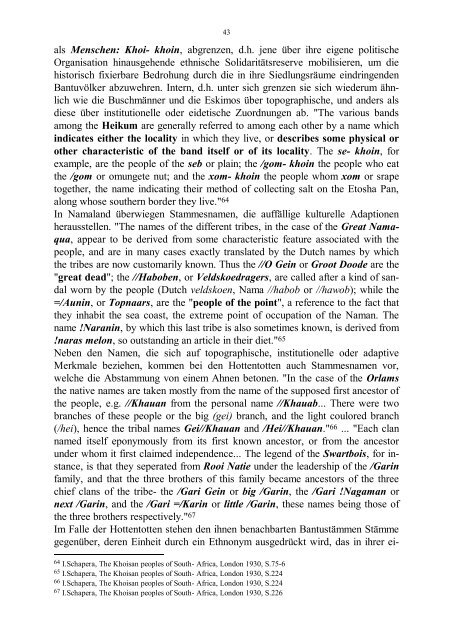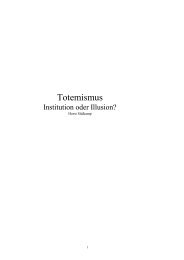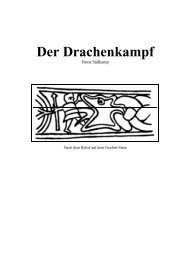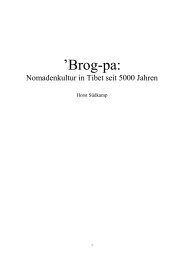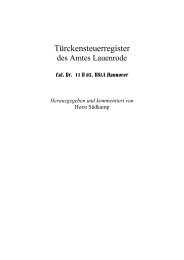Das Ethnonym - Horst Südkamp - Kulturhistorische Studien
Das Ethnonym - Horst Südkamp - Kulturhistorische Studien
Das Ethnonym - Horst Südkamp - Kulturhistorische Studien
Sie wollen auch ein ePaper? Erhöhen Sie die Reichweite Ihrer Titel.
YUMPU macht aus Druck-PDFs automatisch weboptimierte ePaper, die Google liebt.
43<br />
als Menschen: Khoi- khoin, abgrenzen, d.h. jene über ihre eigene politische<br />
Organisation hinausgehende ethnische Solidaritätsreserve mobilisieren, um die<br />
historisch fixierbare Bedrohung durch die in ihre Siedlungsräume eindringenden<br />
Bantuvölker abzuwehren. Intern, d.h. unter sich grenzen sie sich wiederum ähnlich<br />
wie die Buschmänner und die Eskimos über topographische, und anders als<br />
diese über institutionelle oder eidetische Zuordnungen ab. "The various bands<br />
among the Heikum are generally referred to among each other by a name which<br />
indicates either the locality in which they live, or describes some physical or<br />
other characteristic of the band itself or of its locality. The se- khoin, for<br />
example, are the people of the seb or plain; the /gom- khoin the people who eat<br />
the /gom or omungete nut; and the xom- khoin the people whom xom or srape<br />
together, the name indicating their method of collecting salt on the Etosha Pan,<br />
along whose southern border they live." 64<br />
In Namaland überwiegen Stammesnamen, die auffällige kulturelle Adaptionen<br />
herausstellen. "The names of the different tribes, in the case of the Great Namaqua,<br />
appear to be derived from some characteristic feature associated with the<br />
people, and are in many cases exactly translated by the Dutch names by which<br />
the tribes are now customarily known. Thus the //O Gein or Groot Doode are the<br />
"great dead"; the //Haboben, or Veldskoedragers, are called after a kind of sandal<br />
worn by the people (Dutch veldskoen, Nama //habob or //hawob); while the<br />
=/Aunin, or Topnaars, are the "people of the point", a reference to the fact that<br />
they inhabit the sea coast, the extreme point of occupation of the Naman. The<br />
name !Naranin, by which this last tribe is also sometimes known, is derived from<br />
!naras melon, so outstanding an article in their diet." 65<br />
Neben den Namen, die sich auf topographische, institutionelle oder adaptive<br />
Merkmale beziehen, kommen bei den Hottentotten auch Stammesnamen vor,<br />
welche die Abstammung von einem Ahnen betonen. "In the case of the Orlams<br />
the native names are taken mostly from the name of the supposed first ancestor of<br />
the people, e.g. //Khauan from the personal name //Khauab... There were two<br />
branches of these people or the big (gei) branch, and the light coulored branch<br />
(/hei), hence the tribal names Gei//Khauan and /Hei//Khauan." 66 ... "Each clan<br />
named itself eponymously from its first known ancestor, or from the ancestor<br />
under whom it first claimed independence... The legend of the Swartbois, for instance,<br />
is that they seperated from Rooi Natie under the leadership of the /Garin<br />
family, and that the three brothers of this family became ancestors of the three<br />
chief clans of the tribe- the /Gari Gein or big /Garin, the /Gari !Nagaman or<br />
next /Garin, and the /Gari =/Karin or little /Garin, these names being those of<br />
the three brothers respectively." 67<br />
Im Falle der Hottentotten stehen den ihnen benachbarten Bantustämmen Stämme<br />
gegenüber, deren Einheit durch ein <strong>Ethnonym</strong> ausgedrückt wird, das in ihrer ei-<br />
64 I.Schapera, The Khoisan peoples of South- Africa, London 1930, S.75-6<br />
65 I.Schapera, The Khoisan peoples of South- Africa, London 1930, S.224<br />
66 I.Schapera, The Khoisan peoples of South- Africa, London 1930, S.224<br />
67 I.Schapera, The Khoisan peoples of South- Africa, London 1930, S.226


